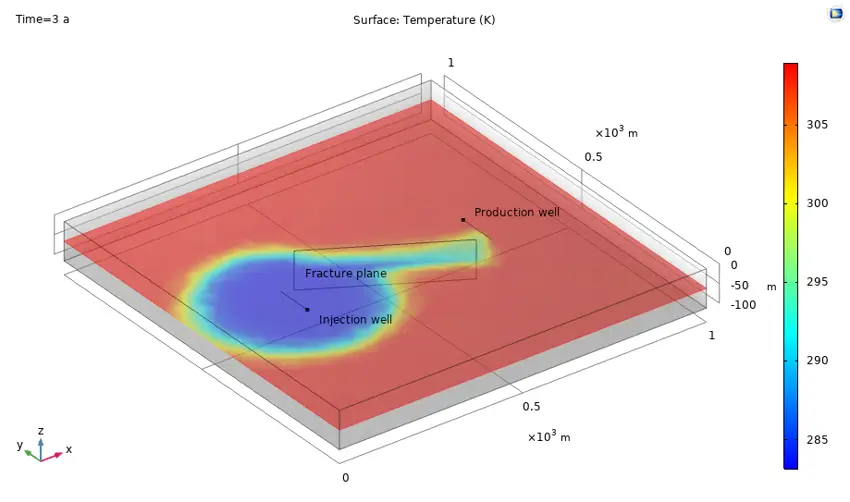There is immense potential to use our underground environment in a responsible manner as we move towards a net zero carbon society. For example, deep rock formations can store captured CO2 emissions, and there is increasing flexibility in the ways that geothermal energy can be recovered.
However, our move towards these technologies should be made carefully since we need to reliably predict how the ground will react, especially given the difficulty of gathering a full picture of conditions at large depths.
This project will improve our fundamental understanding of the interplays between fluid injection and the induced microseismicity and permeability evolution of fractured rocks.
Laboratory experiments will be carried out to study the behaviour of critically stressed fractures under fluid injection, with any slippage being monitored by direct block deformation measurements in each direction, and by Acoustic Emission (AE) monitoring.
The research programme will extend this study via numerical modelling towards linking the geomechanical behaviour of fault reactivation with fluid injection.
Geomechanical behaviour during fracture slip will include the fracture opening and closure, and the shear displacement with any associated shear dilation. The flow regime and the global induced seismicity and permeability of the model domain will be investigated towards an improved understanding of injection-induced seismicity and interactions between fractures.
Outcomes from this project will lead to more accurate prediction and reduced risk of induced microseismicity, currently of practical importance to industry and public stakeholders for the development of geothermal energy and CO2 sequestration, as well as being a topic of significant interest to the general public.
 Geothermal fluid circulation in fractured rock
Geothermal fluid circulation in fractured rock
Publications
- Hosking, L.J., Chen, M., Sandford, R.J., Thomas, H.R. Analysis of coupled dual porosity thermo-hydro-chemo-mechanical behaviour during CO2 injection in coal. International Journal of Rock Mechanics and Mining Sciences, 135
- Ma, Y., Chen, X., Hosking, L.J., Yu, H-S., Thomas, H.R., Norris, S. (2020). The influence of coupled physical swelling and chemical reactions on deformable geomaterials. International Journal for Numerical and Analytical Methods in Geomechanics
- Chen, M., Hosking, L.J., Sandford, R.J., Thomas, H.R. (2020). A coupled compressible flow and geomechanics model for dynamic fracture aperture during carbon sequestration in coal. International Journal for Numerical and Analytical Methods in Geomechanics, 44, pp.1727-1749.
- Chen, M., Hosking, L.J., Sandford, R.J., and Thomas, H.R. (2020). Numerical analysis of improvements to CO2 injectivity in coal seams through fracture connection to the injection well. Rock Mechanics and Rock Engineering, 53, pp.2887–2906 .
- Hosking, L.J. and Thomas, H.R. (2020). Dual porosity modelling of coal core flooding experiments with carbon dioxide. Computers and Geotechnics, 121 .
- Detheridge, A., Hosking, L.J., Thomas, H.R., Sarhosis, V., Gwynn-Jones, D., Scullion, J. (2019). Deep seam and minesoil carbon sequestration potential; South Wales Coalfield, UK. Journal of Environmental Management, 248, pp.1-8 .
- Chen, M., Hosking, L.J., Sandford, R.J., Thomas, H.R. (2019). Dual porosity modelling of the coupled mechanical response of coal to gas flow and adsorption. International Journal of Coal Geology, 205, pp.115-125 .
- Hosking, L.J., Thomas, H.R., Sedighi, M. (2018). A dual porosity model of high-pressure gas flow for geoenergy applications. Canadian Geotechnical Journal, 55(6), pp.839-851 .
- Sarhosis, V., Hosking, L.J., Thomas, H.R. (2018). Carbon sequestration potential of the South Wales Coalfield. Environmental Geotechnics, 5(4), pp.234-246.
Meet the Principal Investigator(s) for the project

Dr Lee Hosking - Lee is a Lecturer in Energy Geomechanics in the Department of Civil and Environmental Engineering. His research focuses on computational modelling of deep subsurface environments with attention to coupled thermal-hydraulic-mechanical (THM) phenomena, accurate and efficient fracture network representation, and damage evolution. For over 10 years, the main practical application of his research has been geological CO₂ storage with respect to storage capacity, injectivity, and migration/confinement, but he has also worked on unconventional geothermal energy systems and radioactive waste disposal. Alongside his research, Lee teaches geo-energy engineering and climate change science, and is Senior Tutor for Civil and Environmental Engineering.
Before joining Brunel in 2020, Lee was a postdoctoral researcher at the Geoenvironmental Research Centre, Cardiff University, where he led the CO₂ sequestration work package of the FLEXIS energy systems research project. He received his PhD from Cardiff University in 2014 for research on coupled THM behaviour during CO₂ injection in coal, having graduated with an MEng Civil Engineering, also from Cardiff University.
Lee's current research projects, funded by The Royal Society and EPSRC (via UKCCSRC and Horizon Europe underwrite), are investigating key aspects of CO₂ storage linked with injection well integrity and the prediction and management of fluid injection-induced seismicity. These projects are being delivered alongside his national and international partners from academia and industry.
His professional affiliations include Fellowship of the Higher Education Academy, membership of the Editorial Board for the journal Deep Underground Science and Engineering, and membership of the UK Carbon Capture and Storage Research Centre, British Geotechnical Association, and International Society for Rock Mechanics and Rock Engineering. Within Brunel's research environment, he is part of the Centre for Energy Efficient and Sustainable Technologies as well as the Two-Phase Flow and Heat Transfer and Geotechnical and Environmental Engineering research groups.
Lee is always looking for talented and motivated PhD students as well as new collaborators for research projects.
Related Research Group(s)
Geotechnical and Environmental Engineering - Delivering a new understanding of our geo-environment and critical infrastructure in diverse ecosystems, for predicting and preventing catastrophic failure and responding to the need for decarbonisation and energy security.
Partnering with confidence
Organisations interested in our research can partner with us with confidence backed by an external and independent benchmark: The Knowledge Exchange Framework. Read more.
Project last modified 02/10/2023